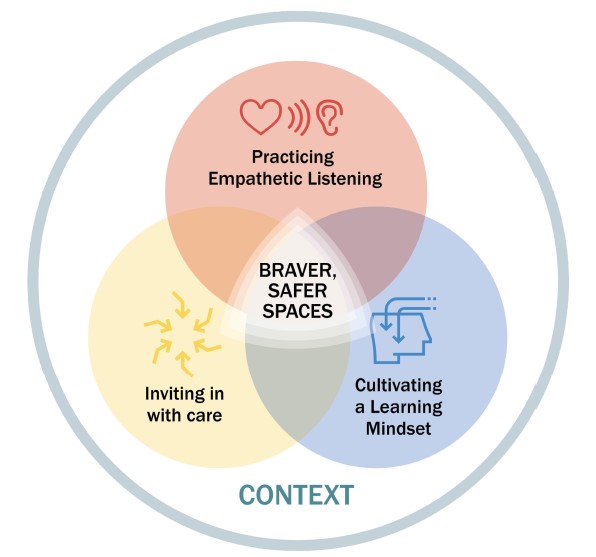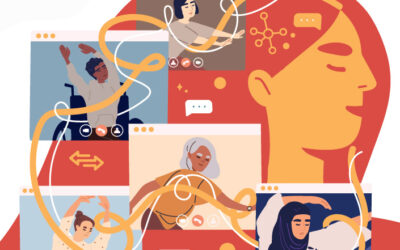
Learning to talk about intersectionality, equity and
anti-Black racism.
We recently launched our very first Connection Café, an interactive monthly workshop with the purpose of engaging women and allied changemakers in meaningful conversation. Our first session was focused on how we can support braver, safer spaces to talk about intersectionality, equity and anti-Black racism. We were intentional about starting the series with this particular conversation because we want to ground this journey in equity, anti-racism and intersectional expertise, perspectives and practices.
We were really fortunate that Chanel Grenaway was our guide for this inaugural session. Chanel has deep experience and knowledge in gender and racial equity, and her human-centered approach helps to make it easier for everyone to engage in these issues bravely and actively.
Chanel set the stage by inviting participants to reflect on a few questions in advance of the session.
Reflection Questions:
- What challenges do you have when engaging in conversations about racism, anti-Black racism, equity or intersectionality?
- As a changemaker, how do you feel during these conversations? What thoughts typically emerge for you?
As we got started, Chanel acknowledged that we could realistically only touch the surface of these complex issues during our short time together. She shared perspectives on why we find ourselves in this consciousness raising moment related to race and racism, and on the importance of not simply being non-racist – we must be actively anti-racist to create equitable opportunities and outcomes.
To be anti-racist, we have to first take accountability for our own learning and race consciousness. These essential building blocks need to be in place and continually examined so that we can bravely participate in conversations that ensure our Black, Indigeneous and People of Colour colleagues remain safe and whole.
Chanel introduced her 3-part approach to supporting safer, braver conversations:
- Inviting people in with care and thoughtfulness
- Cultivating a learning mindset that is open, curious and humble, and
- Practicing empathetic listening.
With coaching and guidance from Chanel, we practiced empathetic listening tools in discussing racism, anti-Black racism, equity and intersectionality. This process reminded us that listening deeply is hard work – and it’s powerful in its simplicity. When we really hear our colleagues and empathize with their experiences, we can humanize complex issues and learn how to be more effective allies.
I am learning that being antiracist is an ongoing process. You don’t have to be an expert to start. I’m not an expert by any means! But I am learning that the more we practice, the more we learn and hopefully the more effective we can be. Every interaction can reinforce or disrupt the systems we are trying to change, so brave conversations are at the core of being antiracist. For me, being a better ally has required me to become a better and more empathetic listener.
I want to thank Chanel and all the dynamic changemakers who joined us. I hope our conversations helped everyone to connect, reflect and refuel their hearts and work.
Our next Connection Cafe conversation on Wednesday, January 20th, 2021 will be Caring For Women Who Care. I hope you can join us. Our guest host will be Pamela Uppal who will help us to unpack women’s care work and the care economy. Pamela and I will co-facilitate a meaningful conversation on the impacts for women of caring for their families, communities and organizations using an intersectional lens. Register now to reserve your spot as spaces are limited!
Lisa Watson
Co-Founder, Openly

Host Chanel Grenaway speaks via Zoom at Openly’s first Connection Café

Chanel’s 3-part model for an inclusive approach to creating meaningful conversations.
Share Openly
Read more about Openly’s Connection Café
Reflections: Making Connections for Inclusivity on Indigenous Lands
Reflecting on Inclusivity on Indigenous Lands Diversity. Equity. Inclusion. Big buzz words for...
Reflections: Exploring Change Through the Wisdom of the Body
Exploring Change Through the Wisdom of the Body: Reflections The work of social change is...
Reflections: Caring for Women Who Care – Reflections
Caring for Women Who Care While the pandemic has highlighted the importance of care work to our...



